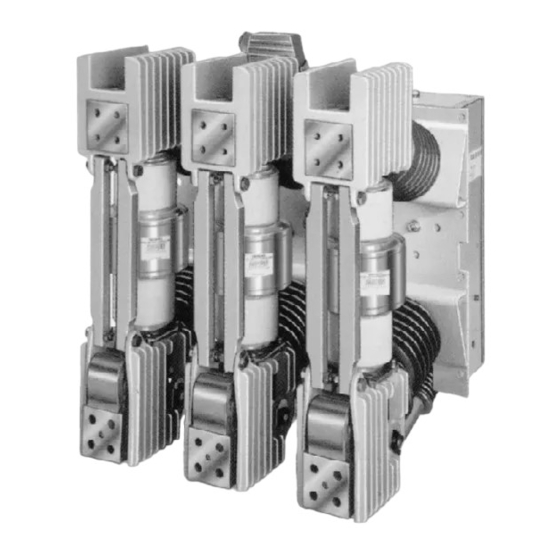Siemens 3AH Instrukcje, instalacja, obsługa, konserwacja - Strona 24
Przeglądaj online lub pobierz pdf Instrukcje, instalacja, obsługa, konserwacja dla Urządzenia przemysłowe Siemens 3AH. Siemens 3AH 33 stron. Vacuum circuit breaker operator module
Również dla Siemens 3AH: Instalacja, obsługa i konserwacja (20 strony), Instrukcja obsługi (38 strony)

Overhaul
Introduction
For following procedures along with the troubleshooting
charts at the end of this section, provide maintenance per-
sonnel with a guide to identifying and correcting possible
malfunctions of the 3AH vacuum circuit breaker.
Hazardous voltages and high speed moving
parts.
Can cause death, severe personal injury, or
property damage.
De-energize breaker and discharge springs
before working on breaker.
Read instruction manual.
Circuit Breaker Overhaul
Table 6 lists the recommended overhaul schedule for 3AH
circuit breakers operating under ANSI usual conditions.
When actual operating conditions are more severe, over-
haul periods should occur more frequently. The counter
on the front panel of the circuit breaker records the num-
ber of operations.
Table 6. Overhaul Schedule
ANSI Usual Conditions
Maintenance Based Upon Number of Closing Operations
Breaker Type
3AH
Replacement at Overhaul
The following components are replaced during an over-
haul of the circuit breaker, when required:
• Vacuum interrupters as determined by vacuum integ-
rity test, contact erosion, or after 10,000 operations.
• Spring Release Coil, 52SRC
• Shunt Trip Coil, 52T
• Trip Free Drive Bar Mechanism
When these parts are charged, locking devices must also
be removed and replaced. These include lock washers,
retaining rings, retaining clips, spring pins, cotter pins, etc.
1. Replace Vacuum Interrupter, instructions follow.
2. Spring Release Coil (52SRC) and Shunt Trip Coil (52T).
a. Remove two "push on" terminal connections
b. Remove two M4 hex head screws and dismount
solenoid drawing it towards you.
Number of
Closing Operations
10,000
c. Install replacement solenoids with two M4 hex head
screws and replace "push on" terminals.
d. Solenoid mounting screws must be installed using
thread locking adhesive (Loctite #222, Siemens part
15-133-281-007) and primer (Loctite primer T,
Siemens part 15-133-281-005).
3. Lubricate operating mechanism in accordance with in-
structions which follow.
4. When work is finished operate circuit breaker, close
open, several times, and check that all screw connec-
tions are tight.
Replacement of Vacuum Interrupters
Replacement interrupters are furnished as a complete as-
sembly.
They have been completely tested and
dielectrically and mechanically conditioned.
It is recommended that one interrupter be removed and
replaced completely rather than removing two or more
interrupters at a time. The following procedure in check
list format describes the procedure for removing and re-
placing a vacuum interrupter. Components may be identi-
fied by reference to Figures 17 and 18.
1. Removing the Interrupter
Note: Special care needs to be exercised in removal
or installation of hardware around the bottom, or
movable contact end, of the vacuum interrupter.
The movable contact uses a metal bellows to main-
tain the vacuum seal while still permitting up and
down motion of the contact. This bellows is rugged
and reliable, and is designed to withstand years of
vertical movement. However, care should be exer-
cised to avoid subjecting the bellows to excessive
torque during removal and replacement. Twisting
the bellows through careless bolt removal or tight-
ening may damage the vacuum interrupter.
1.1 Before starting work, the circuit breaker should be
isolated from all primary and control power
sources and all stored energy discharged by trip-
ping, closing, and tripping the breaker by hand.
Discharge any static charge by grounding all and
center metal sections of the vacuum interrupter.
Carefully remove exterior and interphase barriers.
1.2 Loosen the lateral bolt(s) on terminal clamp (29.2).
Refer to Figure 17 and employ the illustrated pro-
cedure to loosen clamp hardware.
1.3 Withdraw pin (48.5) from insulating coupler (48)
and levers (48.6).
1.4 Remove coupling pin from the eye bolt (36.3)
23
